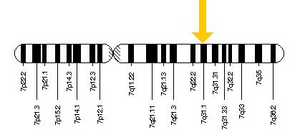FOXP2 facts for kids
FOXP2 is a special gene that helps humans develop speech and language. Think of genes as instructions inside your body. This gene gives the instructions for making a protein called "Forkhead box protein P2." This protein is super important for how we learn to talk and understand words.
This gene isn't just in humans! Many animals with backbones, like birds, also have versions of the FOXP2 gene. In these animals, it often helps with how they communicate. For example, it plays a role in how birds learn their songs.
Scientists were very excited when they found FOXP2 because it was the first gene clearly linked to speech and language. It's sometimes called the "language gene," but that's not quite right. While it's very important, many other genes also work together to help us speak and understand.
Contents
What FOXP2 Does
The FOXP2 gene helps control other genes. It's like a conductor telling other musicians what to do. It makes sure other genes, like CNTNAP2, CTBP1, and SRPX2, work correctly for language development.
When FOXP2 Changes
If there's a small change, or a mutation, in the FOXP2 gene in humans, it can cause problems with speech and language. People with these changes might find it hard to form words or speak clearly. They might also have trouble understanding complex sentences.
Scientists have also noticed that the FOXP2 gene is more active in females than in males. This means it's working harder in girls and women.
FOXP2 in Humans and Chimpanzees
When scientists compared the human FOXP2 protein to the one found in chimpanzees, they found a small but important difference. There are just two tiny changes in the "building blocks" (called amino acids) that make up the protein. These small changes might be part of why humans can speak complex languages, and chimpanzees cannot.
Images for kids
See also
 In Spanish: FoxP2 para niños
In Spanish: FoxP2 para niños




